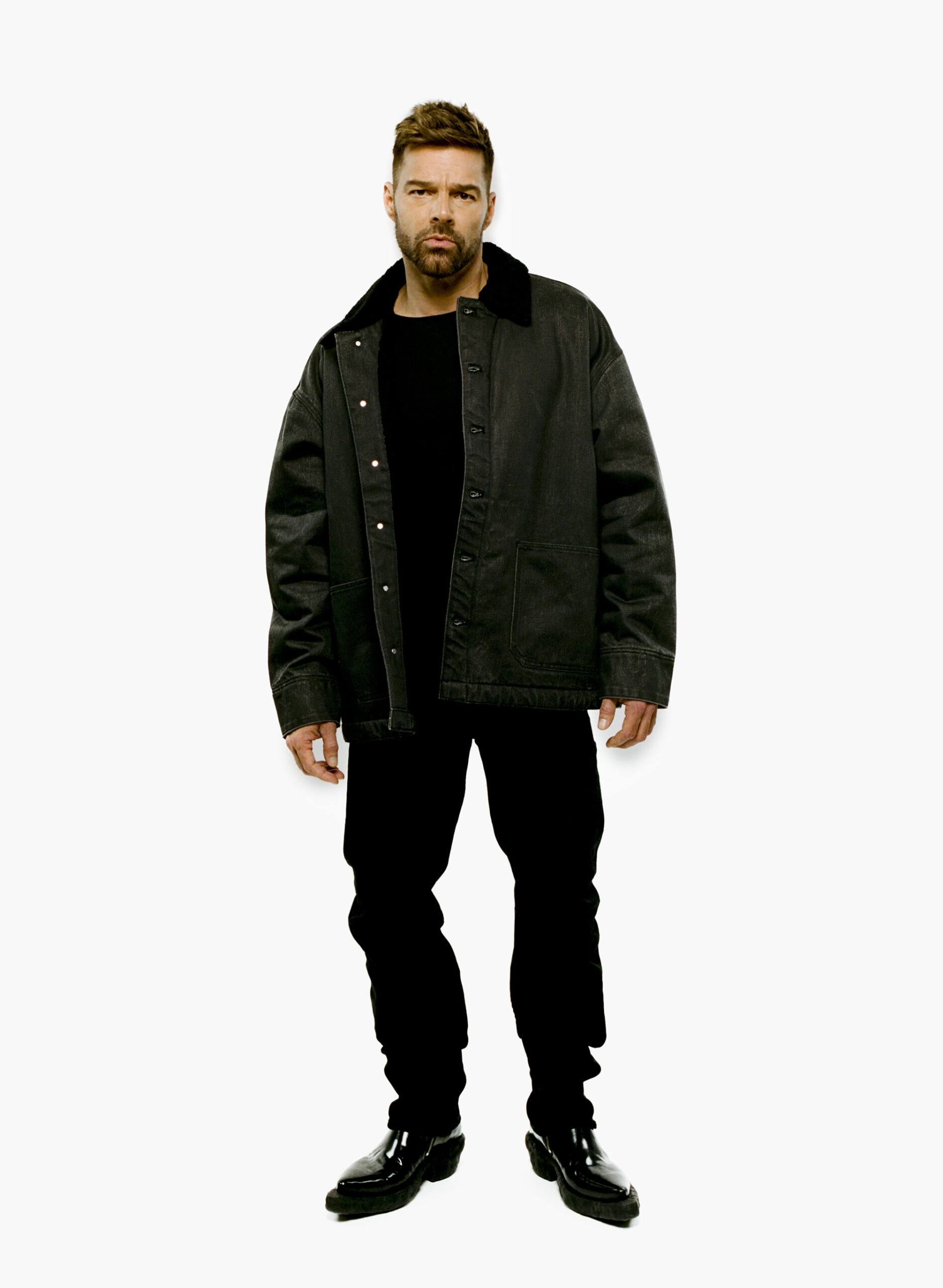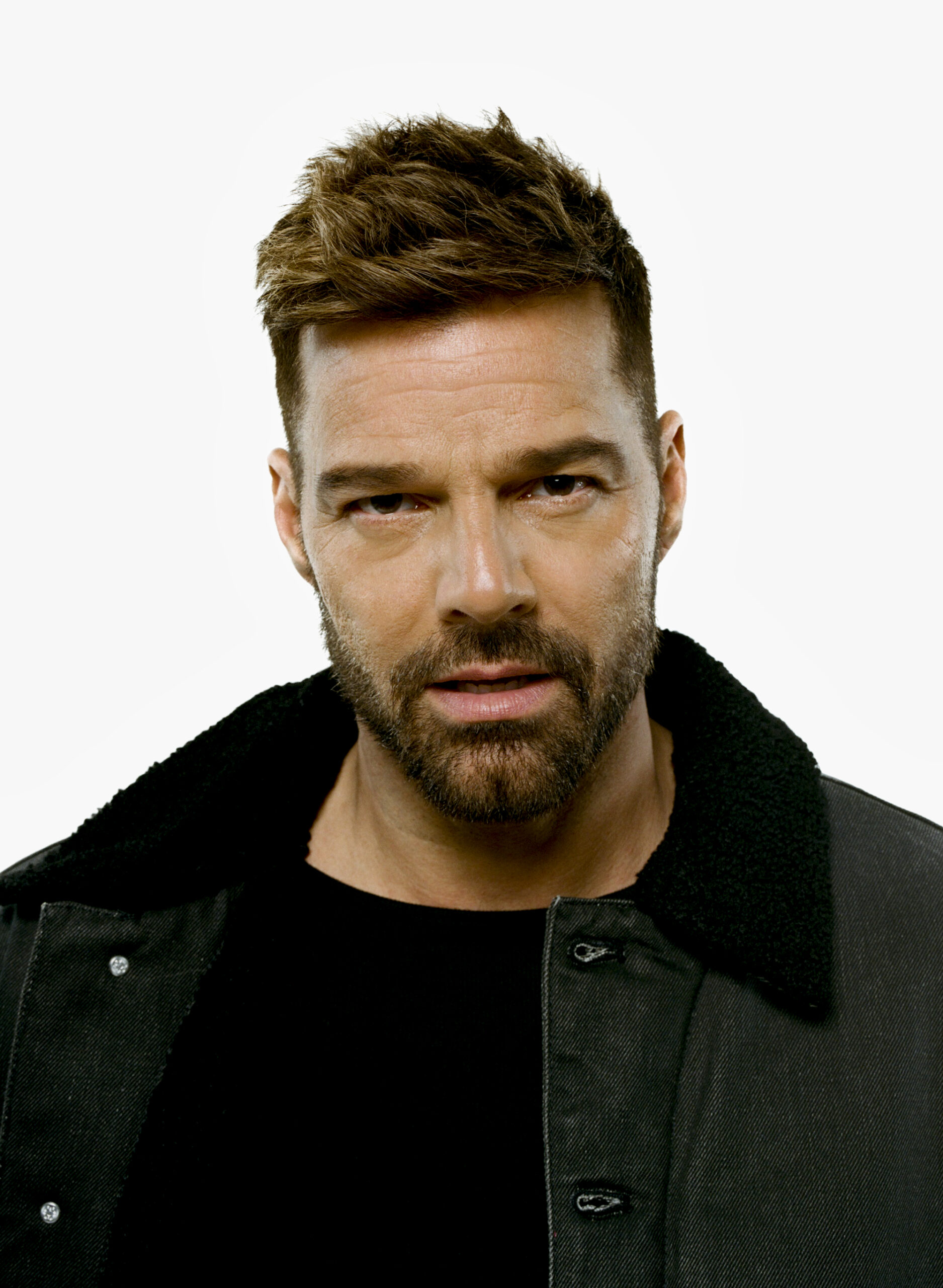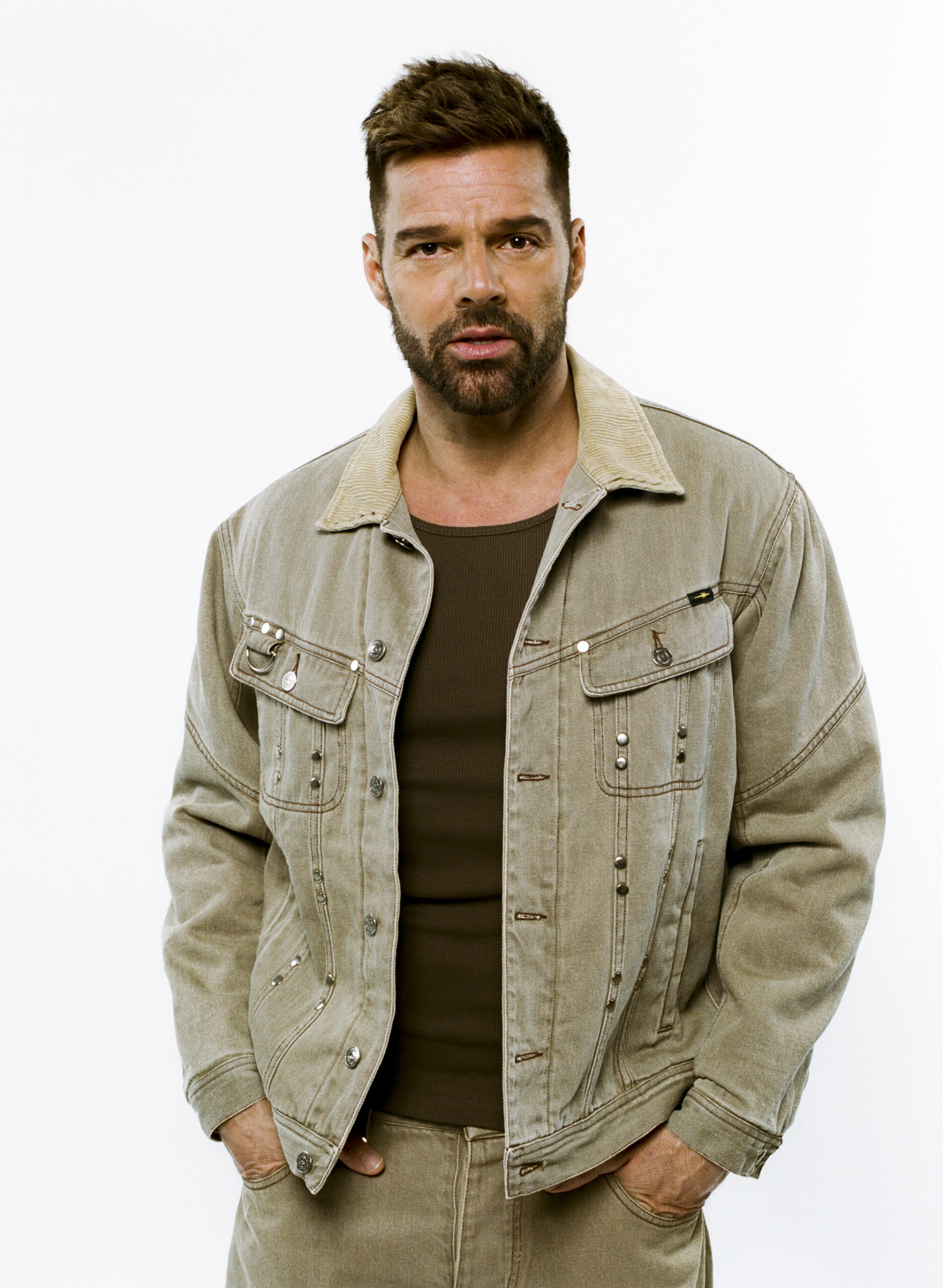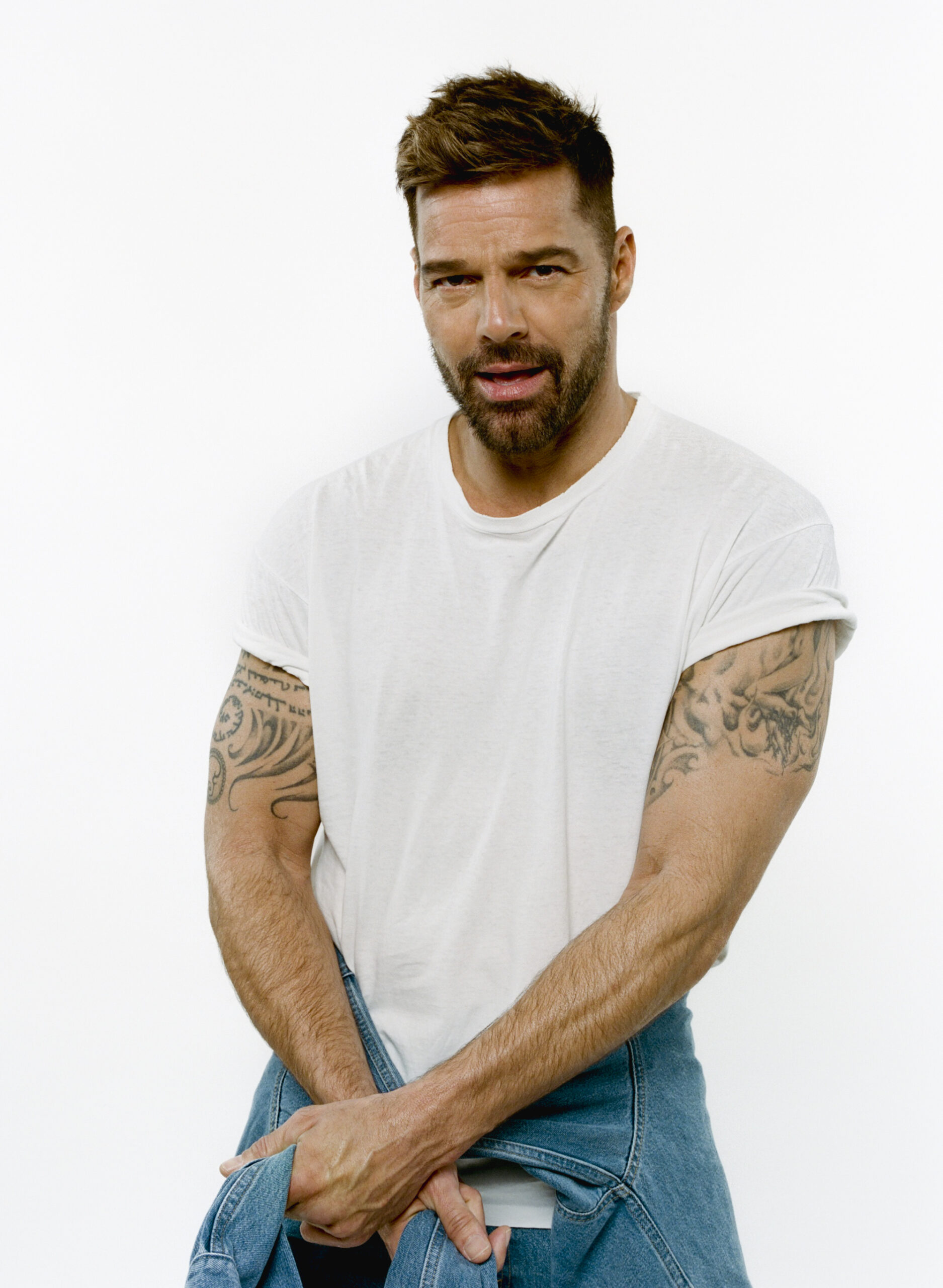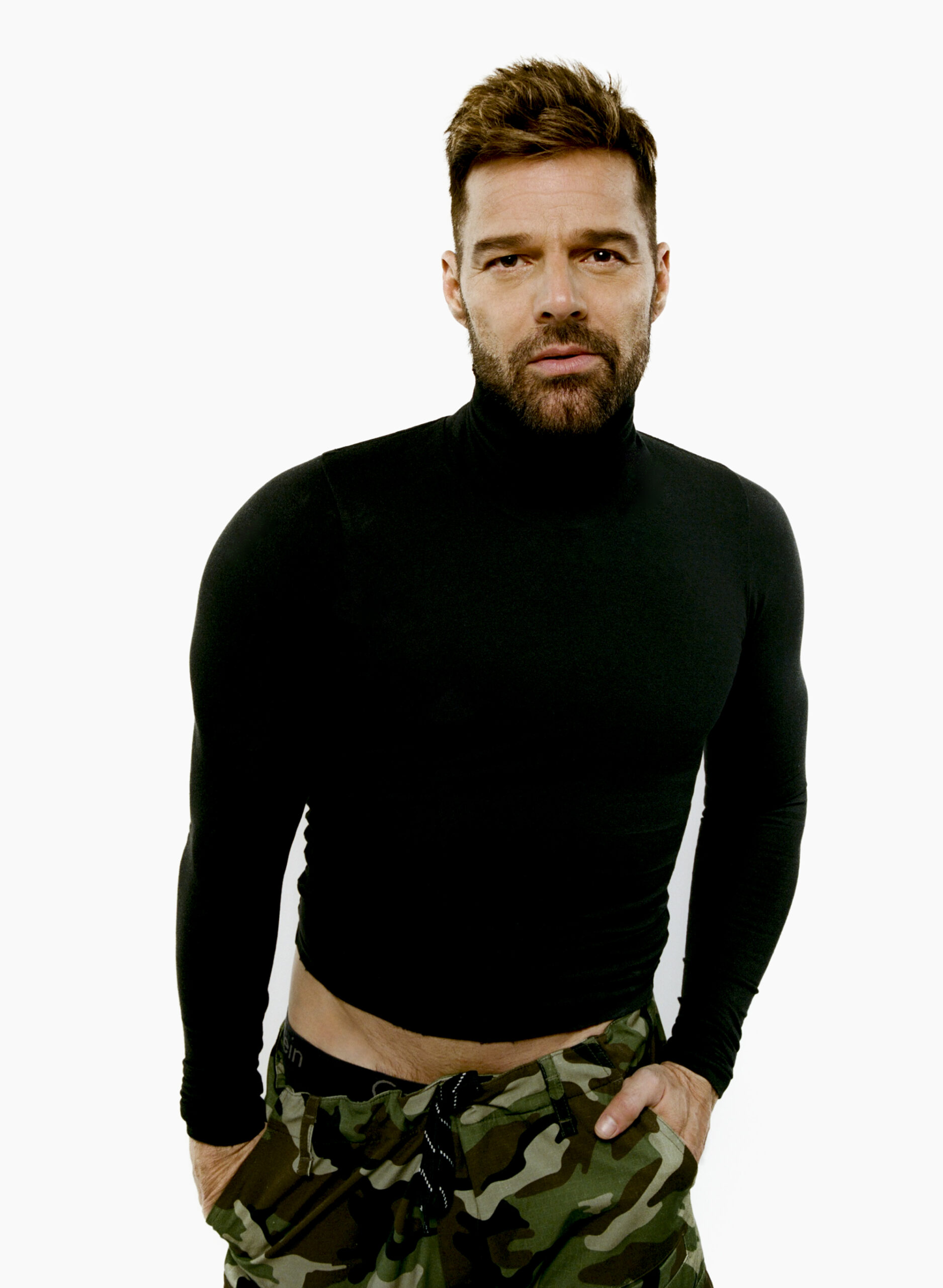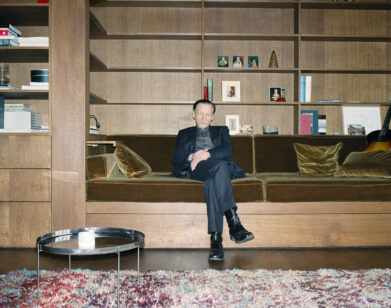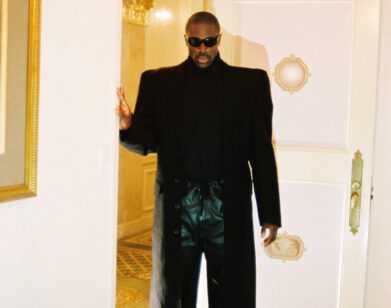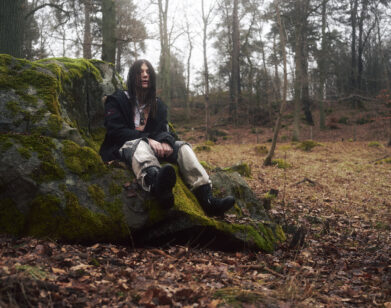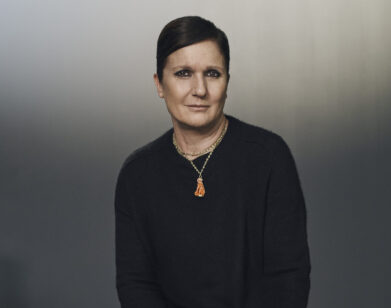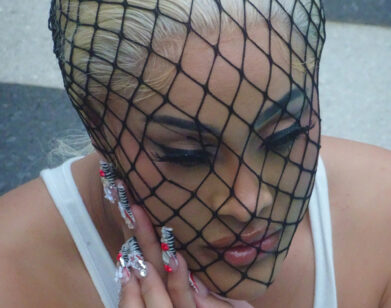PASSION
Ricky Martin Wants to Be Your Fantasy
Ricky Martin loves the camera and the camera loves Ricky Martin. From his early days as a teen idol into his global superstar era, it’s been a perfect match. The mutual love affair continues in Palm Royale, a new Apple TV+ series in which he stars as a butler and confidant to a host of high society women. Ahead of the show’s premiere, Ricky called up his amor and longtime fan Zoe Saldana for a conversation about fame, fatherhood, and his first true passion.
———
SATURDAY 6 PM FEB. 24, 2024 TORONTO
RICKY MARTIN: How are you, love? Good to see you.
ZOE SALDANA: Good to see you, too. Where are you right now?
MARTIN: I’m in Toronto. I have two more weeks of the tour to go, and then we jump straight into the promotion of the show.
SALDANA: Oh, my god. It’s amazing, Ricky.
MARTIN: Gracias mi amor. I’m really happy. Good things are happening. One step at a time. I’m taking care of myself, taking care of my kids, spending a lot of time with them, which is very important. They travel with me.
SALDANA: How old are they?
MARTIN: The twins are 15 and Lucia is 5, and Renn, who’s the baby, he’s 4. They’re only nine months apart. It’s a handful, but I love it. I wouldn’t change it for the world.
SALDANA: Amazing.
MARTIN: It’s good. Thank you for doing this. When they told me that you said yes, I was like, “Yes! Coño! Tiene que hacer ella, que maravilla.” Gracias.
SALDANA: Of course. I’m dying to see the show. I keep watching the trailer for it over and over again. What compelled you to be a part of it?
MARTIN: It all started at an Oscar party after-hours.
SALDANA: [Laughs]
MARTIN: All of a sudden, I’m dancing next to Abe Sylvia, who’s my mentor, and he asked me, “So what are you doing?” Within a week, he sent me the script. I was drooling over the fact that I was going to be able to work with Carol Burnett and all these legends that I love and respect, like Laura Dern and Kristen Wiig and Allison Janney. It’s crazy. Listen, I always throw my wishes up to the sky—call it the universe, call it god, call it whatever. I always wanted to tell stories with an impact, stories that we can watch in 10 years from now and say, “This is still relevant.”
SALDANA: Yeah. And you’re not just working with your idols, you’re an idol yourself, and you’re also making love to these characters. So you’re basically making love to Carol Burnett. [Laughs]
MARTIN: [Laughs] We had the best time together. The first couple of episodes, she’s in a coma and I’m taking care of her. She would walk on set every day and throw out a good morning with so much love and intention that she would set the tone immediately.
SALDANA: That’s so great.
MARTIN: And then Kristen and her energy. Her character is so powerful, and I’m supposed to not like her, but it’s impossible not to love her because she’s just funny, caring, and witty, and at the same time extremely sad. She gave me so much. I’m very lucky to be part of this project.
SALDANA: So you believe that this was something you manifested?
MARTIN: It’s weird because when I was 15 years old, that was the first time I was in front of a camera and I heard, “Action.” I was living in Argentina and I loved it. I love what that series Por siempre amigos was about. It was like Glee but it was very dark and my character was feeling a lot of sadness. For some reason, I tapped into that emotion, and it was addictive. But then music was so powerful that I had no choice but to hop on that wave. I wanted acceptance, I wanted recognition, and music was giving me that instant gratification. So I stayed in it.
SALDANA: So you’re saying that your first true passion was acting?
MARTIN: I started when I was 12 years old in Menudo, but I started doing TV commercials when I was 8 years old, and I just thought, “I don’t know exactly what I want to be, but I love being in front of the camera.”
SALDANA: Yes.
MARTIN: So Menudo was the perfect platform to do something in front of an audience. I always thought that Menudo was an amazing musical theatrical play, because they would tell us what to do, they gave us a script, told us what to wear, told us who to be. They even changed my name. My name is Enrique, and they said, “From now on, you’re going to be called Ricky.” So I was just, like, “Whatever you want. I just want to feel the audience. I want to be an artist.”
SALDANA: Yes.
MARTIN: So being in the band gave us this opportunity to act. Then after three years, we moved to Argentina, and that’s when I started feeling the passion of acting for the first time. I fell in love with that even more than music, to be quite honest. But like I said, I was part of the band and I needed to do what they were telling me to do.
SALDANA: We don’t really talk that much about how art is so fluid. When you’re born to be an artist, whatever medium you’re able to express yourself in, you let it be at that moment. Music opened the door for you, and then you experimented with acting, but music wasn’t done with you, and you embarked on this amazing journey. Ricky, I used to read Tú magazine, okay? And you were always on the cover.
MARTIN: [Laughs] Right.
SALDANA: ¿Y tú quién eres? Come on! Cada domingo! Every Sunday you were there. Every time you worked with an amazing actress to feature in your videos, I’d watch. You gave me and my sisters goosebumps every day.
MARTIN: Oh my god.
SALDANA: So to see you have this fluidity as an artist is inspiring. But I’ve been meaning to ask you, how has fatherhood changed the way you approach your music and your career?
MARTIN: It’s incredible. I have a daughter, Lucia, she’s only 5 years old, and I took her to the pediatrician last week and the doctor asked, “Lucia, what do you want to be when you grow up?” And she said, “I want to be a singer.” My heart wanted to come out of my mouth because I always said she was a star. And my ex-husband believes the same thing. When the twins were born, I wrote a song called “The Best Thing About Me Is You.” I never said, “This is for my children,” but, hey, it was for them.
SALDANA: You’ve had an incredible career for decades now. At what moment did you feel like, “Estoy aquí. He llegado. This is it.”?
MARTIN: It goes by decades. I started in 1984 professionally, and I think we’re survivors. We’re still here. For the first decade, we found the era of Menudo and the success of a first solo album. And then 10 years later, the international recognition, from working in Mexico doing theater and soap operas, and all of a sudden, I go to Spain and I’m the first artist to break that music barrier of being successful in Europe. That was very powerful. That year, we did a tour in India. We went to China. Then we sang the anthem for the World Cup in France. I had a Spanish song that became number one in 70-something countries, so I said, “Okay, I’m good. I can live with everything that I’ve done. I think I want to take a break.” And then “Livin’ La Vida Loca” came, and then I said, “Okay, I guess it’s not time to take a break. I guess we gotta keep pushing through.” [Laughs]
SALDANA: Wow.
MARTIN: I think this is my fourth decade. I’m in a really cool place and I’m still with the energy and optimism about what life is offering, and it’s full-on gratitude. I can’t complain. It’s full of ups and downs of course, because it’s life, but I’m focusing on the light and my eyes are open to all the lessons that are coming.
SALDANA: Well, now we’re going to get a little serious. You’ve been open about the challenges of fame. What was the lowest point for you, and how did you feel that you were able to climb out of it? Without getting too personal, of course.
MARTIN: Listen, Zoe, I’m an open book. Because for many years, I was not, and it was extremely painful. At this point of my life, I want to be transparent. I don’t want masks because that’s extremely dangerous, not only for me, but now for my children, because I don’t want to teach them to lie. I don’t want to teach them to live their truth with half a window open. I want them to be able to be comfortable in their skin, because I know what it is not to be. Being able to write a book that allowed me to open up and talk about my sexual identity was wonderful. It was the beginning of another era for me.
SALDANA: On that note, you’ve been a champion for LGBTQ+ rights. What progress in the movement are you most proud of and what do you think is the next big battle?
MARTIN: We take solid steps, but there’s still so much hate out there. The world is so divided, and unfortunately, people don’t let people live, and some people don’t let people be. And we just have to be proud, and loud—as any minority, not only the LGBTQ+ community, the Latin community, the African-American community. We just have to hold our hands and grow, and walk through life with pride and honor, and educate ourselves about who we are, and what we’re made of, and what we need. Because we’re not asking to have more than others. We just want equality.
SALDANA: That is the ongoing battle. It’s education. We’re going to go back to something more spicy, because you’ve been a sex symbol. My god. ¿Ay, quién se compara con Ricky Martin?
MARTIN: Well… [Laughs]
SALDANA: How do you feel about that label and has your relationship with it changed over time?
MARTIN: I have to go back to Menudo, because we were five teenagers—the more we moved, the more the girls would scream. And it was a competition. So even though we were brothers and we supported each other, every time we had a solo song, we had to show off. So we were trained to play with that sensuality at a young age. Adding to that, the fact that we’re from the Caribbean and there’s something in the water, there’s something in the air.
SALDANA: What is it? [Laughs]
MARTIN: I don’t know. Look at reggaeton today and people dancing, how sexy it is, and the merengue, and the salsa. It’s something that we can’t fight. We’re born with it, and we should not be afraid of it. Now the sex symbol situation’s sometimes annoying because you say, “Yeah, I want people to take me seriously for my work, and my music, and for the parts that I do,” and then you have my mom that tells me, “Ay, nene, please. Be proud of what you have, and everything will come afterwards.” So I guess we can’t fight it. It is what it is. And the perception, we throw something out there and the audience can make of it whatever they want. And I guess fantasize about me however you want to. [Laughs] I really don’t mind.
SALDANA: “Let your husband fantasize about me.”
MARTIN: Yeah, of course. Why not?
SALDANA: “Dale, dale.”
MARTIN: [Laughs] Go ahead. Green light.
SALDANA: In your career, you’ve seen the music industry go through so many changes. What’s one change that has been particularly detrimental or beneficial for artists?
MARTIN: You cannot tell the Mississippi River to go upstream. Music is the same. It travels with force in a specific direction. And you can stand aside and look at how it’s progressing, enjoy it, have fun with it, and try to create evolution with the sound that already exists. I’ve had the opportunity to be onstage with Luciano Pavarotti, and I’ve had the opportunity to be in a studio with Bad Bunny. And I love what’s going on right now with the reggaeton because it’s so in-your-face. It’s raw and real.
SALDANA: You’re known as someone that is bold and not shy to jump in different genres in music. What’s one genre that you would want to jump onto next that you haven’t?
MARTIN: I wouldn’t mind doing bachata. It’s about having the opportunity to be with the maestro of the genre. If you’re going to go into a bachata, let’s go with people that can teach you how to do it and do it right. That’s why I believe that collaborations are so important. Just like when I had the opportunity to jump into reggaeton—I was with Residente and Bad Bunny. I’m sitting there and learning, even though I’ve been onstage 30 years more than them. I know nothing. The moment you think you know it all in music, you lose.
SALDANA: Absolutely. It’s the same in acting, right?
MARTIN: Humility is important. That is the key to longevity.
SALDANA: Looking back at your younger self, just starting out in the industry, what advice would you give yourself ?
MARTIN: [Pauses] Always speak your truth. Always surround yourself with good people. You can’t do it alone.
SALDANA: That’s beautiful. I love that you took your time. Surround yourself with good people, that resonates.
MARTIN: That’s it. Because you can get seduced by fame and all of a sudden, you think you know it all and no one can stop you. You have to have people that tell you, “No. That’s not good for you and your career.” And I have that.
SALDANA: So now, looking to the future, what’s one thing you still dream of achieving that you feel you haven’t yet?
MARTIN: This is hard because I’m very pleased with the things I’ve done. I’d love to go back to the big screen, but I’m not in a rush. I know the right project is going to come, and it’s going to be something beautiful and powerful. I’d love to go back to Broadway and maybe do a one-man show. Is that too crazy? Broadway is very, very intense.
SALDANA: But you grew up onstage, you can totally do it.
MARTIN: So maybe something like that would be interesting. And now I’m doing something that I’ve always wanted to do, which is touring with a symphony, and that has been very, very, very powerful. I walk onstage and I get goosebumps because to have the power of 40, 50, 60 musicians behind you playing your music, the music that you have known for so many years, is very magical.
SALDANA: Manifested. You’re a magician. Look at Palm Royale.
MARTIN: The show is funny, but it’s also dark. And everybody has crazy secrets, and my character knows them all. I’m not going to say anything else. [Laughs]
SALDANA: I’m proud of you. And I can’t wait to watch the show. And thank you for granting me the opportunity of having this conversation with you. It’s so inspiring.
MARTIN: No, no, thank you, por favor. I know it’s busy. And you took the moment to do this on a Saturday. You’re amazing, Zoe. Much love and mad respect.
SALDANA: Siempre, mi amor. Cuidate. Un beso a la familia.
MARTIN: Un beso a la familia.
SALDANA: A ti también. Ciao.
———
Hair: Shaul Arbiv using Mr. Smith Hair Care.
Makeup: Barbara Guillaume using Circa 1970 Face Oil at Forward Artists.
Photography Assistant: Brandon Noriega.
Fashion Assistant: Jake Westmore.
Location: Edge Studios.

